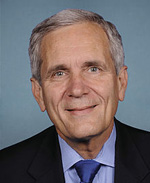 |
| Rep. Lloyd Doggett (D-TX) |
Up in arms about rising drug prices, a cadre of lawmakers have called for congressional action. But the lawmaking process won't happen quickly enough for some of them. They're urging officials at the National Institutes of Health (NIH) and the U.S. Department of Health and Human Services (HHS) to take some "extraordinary" action.
Rep. Lloyd Doggett (D-TX) and a group of more than 50 members of Congress wrote the NIH and HHS, urging the agencies to issue guidelines for a process to skirt patent protections on pricey drugs developed with federal funding. The NIH has "march-in rights," the lawmakers say, allowing them to open up branded drugs to generic competition.
Current laws would allow march-in rights to be implemented when "action is necessary to alleviate health and safety needs which are not being reasonably satisfied" or when the benefits of a patented drug are not "available to the public on reasonable terms," the lawmakers said in their note.
The NIH has called the process an "extraordinary remedy" that should only be used in extreme situations. But the congressional reps contend that a rising tide of drug price increases constitutes immediate grounds for action. "Too many families and providers are facing an extraordinary challenge from unreasonably priced pharmaceuticals" and "too many drugs are not 'available to the public on reasonable terms,'" the lawmakers said, which should in turn prompt the agencies to issue the patent guidelines.
But the NIH isn't laying out a plan of action just yet. "We can confirm we received the letter," the agency told FiercePharma in an email. "A response will be sent directly to Members of Congress."
Although companies such as Valeant Pharmaceuticals ($VRX) and Turing Pharmaceuticals have taken most of the heat lately over price increases, rising costs are a "widespread problem" that's "not limited to one disease or treatment," Doggett said in a statement. In their letter, the lawmakers pointed to a recent report which found that by 2020, specialty drugs will only make up about 2% of prescriptions but will account for 30% of drug spending. Price increases could spell higher taxes or cuts to Medicare and Medicaid programs, which already spend about $140 billion on prescription drugs each year.
"There is a difference between earning a profit and profiteering. The Administration should use every tool it has to rein in the practice of pricing a drug at whatever the sick, suffering or dying will pay," Doggett said.
Meanwhile, lawmakers in both the House and Senate have advanced proposals to curb the rising costs of prescription meds. The Affordable Drug Pricing Task Force led by Democrats on the House Committee on Oversight & Government Reform has pledged "meaningful action" to fight sky-high prices. The group has petitioned committee Chairman Jason Chaffetz to subpoena Valeant CEO J. Michael Pearson for documents about price increases, planning a hearing to investigate companies' pricing policies.
The U.S. Senate Special Committee on Aging led by Sen. Claire McCaskill (D-MO) is taking similar action. Back in November, the committee revealed a new probe into drug pricing at Valeant and Turing, demanding that both companies hand over information about recent price hikes for some of its meds.
- read the letter (PDF)
- here's Doggett's statement
Special Reports: 10 big brands keep pumping out big bucks, with a little help from price hikes | The top 10 most expensive drugs of 2013
Editor's note: This article was updated with a statement from the NIH.